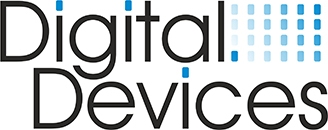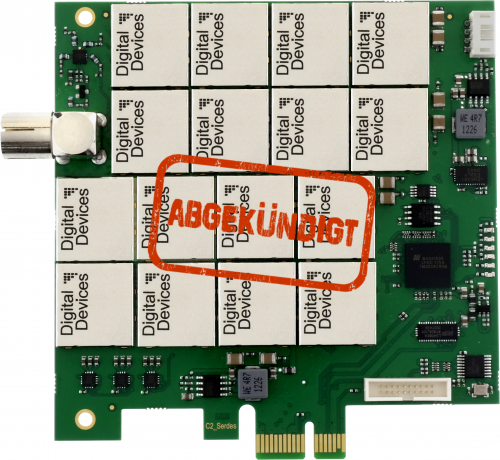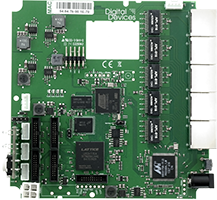DVB-C/C2/T/T2 Tuner
- 8x DVB-C/C2 (Kabel-Tuner) oder
- 8x DVB-T/T2 (Terrestrischer Tuner)
- Gleichzeitig eine Sendung sehen und andere Sendungen aufnehmen
- Live TV
- Timeshift
HDTV Empfang – 1080p
Unterstützung vieler TV-Applikationen
- z. B. Microsoft Windows® Media Center 7/8
- DVBViewer, Media Portal, Gen2VDR, MythTV
Neues Übertragungsverfahren
- Vorbereitete Differentielle Anbindung des Datenkabels (LVDS) > 400% mehr Datendurchsatz (UltraHD)
- Abwärtskompatibel zum klassischen Übertragungsverfahren mit 80 Mbit
Erweiterbares Modulsystem
- Anschluss an die Octopus NET (20-pol. Datenkabel)
DVB-T2 Merkmale
- DVB-T2 Spezifikation Versionen: 1.1.1, 1.2.1 und 1.3.1
- DVB-T2 Base Profile
- DVB-T2 Lite(!) Profile
ISDB-T Merkmale
- Conforms to ARIB STD-B31
- 6 MHz, 7 MHz and 8 MHz BW support
- Excellent phase noise resistance
- Excellent multipath equalization performance
- Automatic detection of mode/guard interval lengths
- EWS (Emergency Warning System) flag output
Einkabellösung (Master/Slave)
- Ein Antennenkabel versorgt alle Tuner.
Geeignet für sehr kompakte Gehäuse
PCIexpress
- Anschluss via PCIe x1 bis x16 slot
GT-Link Port
- zum Anschluss an eine Octopus NET (Datenrate > 1 GBit)
- Hinweis: Betrieb an PCI Express oder GT-Link Port
Umweltfreundliche Green IT
- Leistungsaufnahme max. 16,2 Watt, aktive Kühlung im Gehäuse erforderlich
- Ohne Tantalkondensatoren
- Ohne Elektrolytkondensatoren
Unterstützte Betriebssysteme
- Microsoft Windows® 7/8(.1)/10
- Linux (ab Kernel 2.6.34)
DVB-C Merkmale
- Frequenzbereich: 51 – 858 MHz
- Alle Modulatios- und Codearten nach DVB-C Spezifikation
- Symbolraten von 0,87 bis 6,9 MBaud
- Empfindlichkeit: 47 dbµV (64QAM), 47 dbµV (256QAM)
DVB-C2 Merkmale
- Demodulation
- 16, 64, 256, 1024, 4096 QAM
- 2/3, 3/4, 4/5, 5/6, 8/9, 9/10 Code Rates
- 1/64 and 1/128 Guard Intervals
- 8 MHz and 6 MHz channel bandwidths
- Data Slices Types 1 & 2 supported
- Data Slice width up to 7.61 MHz
- Stream processor for automatic common-PLP and data-PLP combination
- FEC Header Type, Robust mode, High Efficiency mode
- Notch Support
- Narrowband and broadband notches
- Reception of narrow channels down to 2 MHz between broadband notches
- Time interleaving modes 4, 8 symbols and ‚best fit‘
DVB-T/T2 Merkmale:
- Frequenzbereich: 49 – 861MHz, 2k&8k OFDM
- Alle Modulationsarten nach DVB-T und DVB-T2 Spezifikation
- Empfindlichkeit: -83,0 dBm bei 16-QAM&3/4
ISDB-T Merkmale
- Conforms to ARIB STD-B31
- 6 MHz, 7 MHz and 8 MHz BW support
- Excellent phase noise resistance
- Excellent multipath equalization performance
- Automatic detection of mode/guard interval lengths
- EWS (Emergency Warning System) flag output
Standard Anschlüsse
- PCI Express
- IEC Buchse (Input)
- 1x 20-pol. Datenanschluss für differentielle Anbindung des Datenkabels (LVDS) an die Octopus NET
- abwärtskompatibel zum klassischen Übertragungsverfahren mit 80 MBit
Umweltstandards
- RoHS Konformität
- WEEE DE 99353762
Leistungsaufnahme typisch
- DVB-T2: 8,6 Watt (worst case -80 dBm QAM256 7/8)
- DVB-C: 13 Watt
- Hinweis: aktive Kühlung erforderlich, passive Kühlung reicht nicht aus
Unterstützte Betriebssysteme
- Linux (ab Kernel 2.6.34)
- Microsoft Windows® 7 (32/64 Bit) (inkl. Windows® Media Center)
- Microsoft Windows® 8 (32/64 Bit) (inkl. Windows® Media Center)
- Microsoft Windows® 10 (32/64 Bit)
Systemvoraussetzungen
- Dual Core Intel® oder AMD® CPU
- 512 MB RAM
- ein freier PCIe Steckplatz (x1 bis x16)
Abmessungen
- L 104 mm, B 111 mm, H 15 mm
Octopus NET Rack
Die Octopus NET Rack ist modular aufgebaut und kann mit den DuoFlex S2, den DuoFlex C/T und dem Flex CI Common Interface in allen Kombinationsmöglichkeiten bestückt werden.



